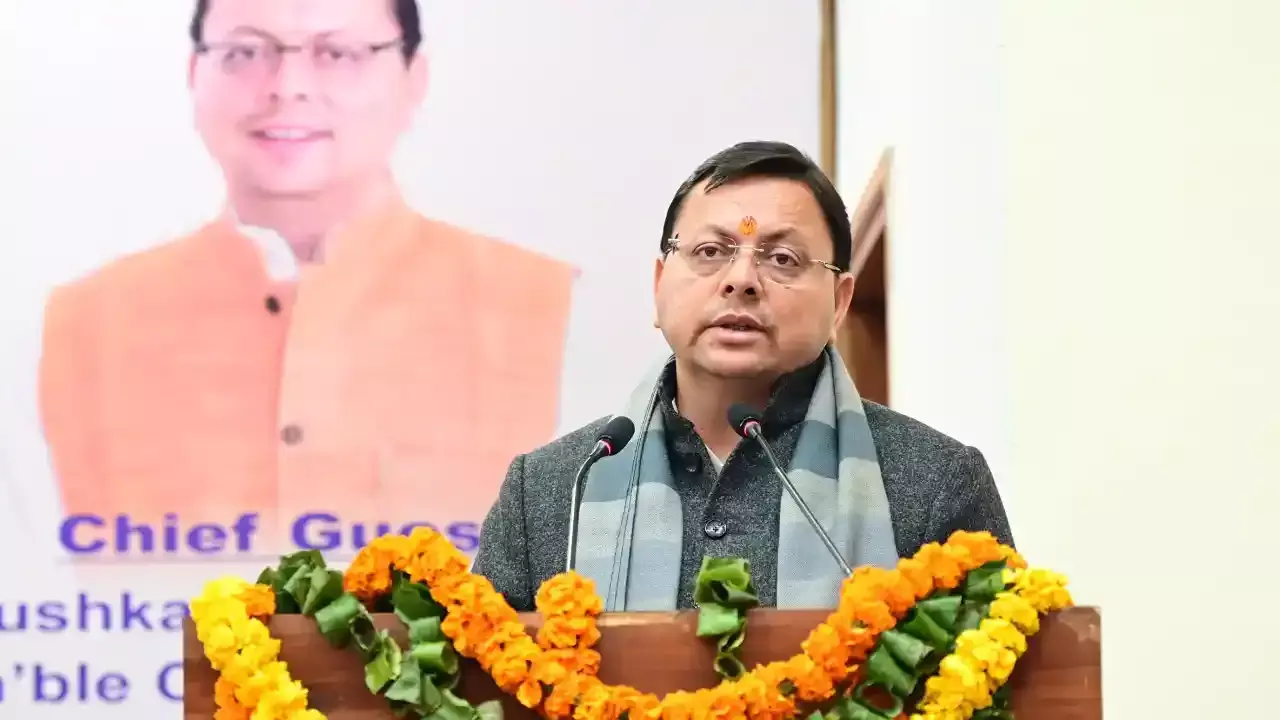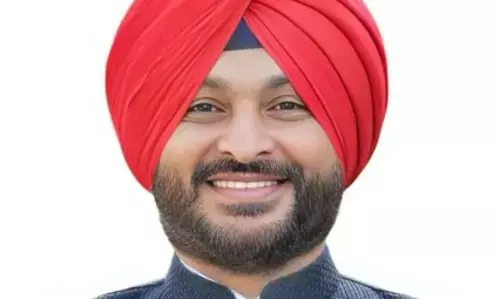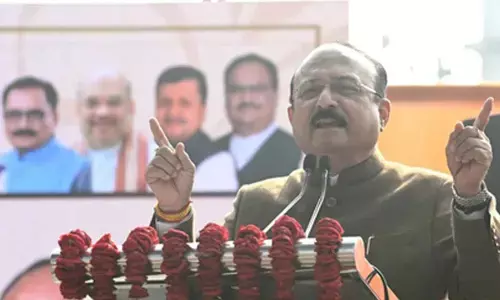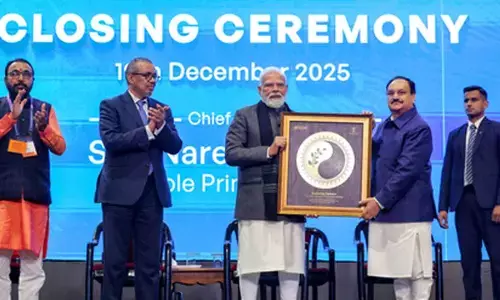Whither 12% quotas for Muslims?
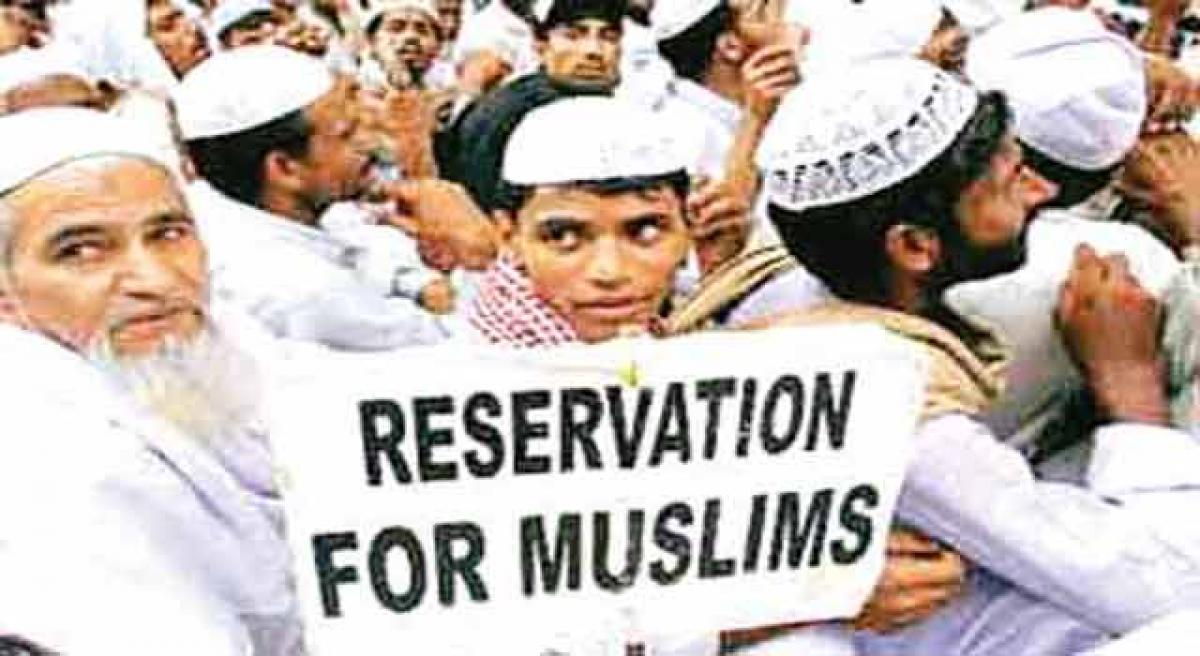
The Telangana Rashtra Samiti (TRS) promised 12 per cent reservations for Muslims in Telangana. The government and the ruling party continue to reiterate this commitment. But, in a calculated attempt to expose the procrastination in implementation, the Congress party has taken up the campaign, demanding quota for Muslims.
The Telangana Rashtra Samiti (TRS) promised 12 per cent reservations for Muslims in Telangana. The government and the ruling party continue to reiterate this commitment. But, in a calculated attempt to expose the procrastination in implementation, the Congress party has taken up the campaign, demanding quota for Muslims.
Religion cannot be the basis for either extending the benefits of reservation or denying them to any section of population. Muslims as a whole cannot be eligible for reservations. It is not just constitutionally impermissible but even socially undesirable. But, the groups which are socially deprived should be identified among the Muslim community. Even the 12 per cent quota has no proper basis
But, the political slugfest conveniently sidesteps several constitutional and legal impediments in the way of implementing the reservations for Muslims. The policies of political appeasement have a vested interest in keeping the issue alive.
Hence, the frantic race to appropriate the political or electoral dividend emanating from such a policy outcome. But, the political system is in no mood to clarify the critical questions on this issue so as to make a worthwhile headway in ensuring justice to the marginalised among the minorities.
First, the Constitution of India does not in any way allow religious-based reservations in India. The Muslims as a category of population were never socially oppressed in India, though there are significantly higher levels of social and economic deprivation. At times, these sections were part of the ruling classes, too.
However, religion cannot be the basis for either extending the benefits of reservation or denying them to any section of population. For instance, if a washer man goes to a temple, he enjoys the reservation benefits as one will be classified under OBCs. But, if the same washer man goes to a mosque, he will not be eligible for reservations.
This anomaly goes contrary to the very provisions of the Constitution of India that bars discrimination on basis of religion, too. In fact, the Constitution of India grants freedom of worship as a fundamental right. Reservations are a result of positive discrimination in the form of such an affirmative action by the State towards deprived classes.
There cannot be any conflict between the two. How can one provision that guarantees a fundamental right deprive or determine yet another benefit granted by the Constitution itself?
Several committees and Commissions like Sachar Committee and Ranganath Mishra Commission have documented the multiple forms of social and economic deprivation suffered by the Muslims in India to a large measure which in fact are much higher than even OBCs in certain aspects.
Thus, religion cannot be the basis for excluding the Muslims from the purview of the benefits of reservations. However, Muslims as a whole cannot be eligible for reservations. It is not just constitutionally impermissible but even socially undesirable. The British India was a witness to imperialist tactics to divide the nation along communal lines.
Thus, reservations for Muslim religious community would trigger a high-level communal polarisation detrimental to the interests of the minorities in particular and the nation in general.
The opponents of any sort of reservations for Muslims argue that casteism is the character of Hinduism. The Islam does not accept casteism.
Therefore, reservations cannot be extended to them even if they are socially and economically marginalised. But, such an argument ignores what the apex court said in its several judgments spread over decades.
The long held position of the Supreme Court is that caste alone cannot be the criteria for reservations, though there is significant overlapping of caste and class in India.
The Constitution in fact accords the benefits of reservation for socially and educationally Backward Classes rather than castes. The apex court also advocated formulation of new and creative basis for reservation other than the caste.
Thus religion cannot be the criteria for either inclusion or exclusion of Muslims from the purview of the reservations. But, the groups which are socially deprived should be identified among the Muslim religious community.
Such an exercise cannot be at the will and wish of the government of the day. A duly constituted Backward Classes Commission alone is empowered to undertake such an exercise.
Any assurance on Muslim reservation bereft of these concrete realities is only an empty rhetoric that could do little or no social justice to the minorities but would only serve the partisan interests of any political party.
The protagonists of quota for Muslims often argue that 12 per cent reservations are sought as it is proportionate to their share in the population of the state. But this argument has many flaws.
First, as explained above Muslims as a whole cannot avail of reservations as the Constitution of India disallows religion-based quotas. Backward sections among the Muslims therefore do not account for the same proportion of population.
Thus 12 per cent quota has no proper basis. The constitutional and legal provisions do not mandate reservations proportionate to the share in population, especially in regard to the OBCs or other sections.
The Mandal Commission estimated that OBCs constitute over 50 per cent of the total population. But, they do not enjoy the same proportion of reservations.
Finally, if Muslims are given 12 per cent reservations, the total quantum of reservations would cross legally stipulated 50 per cent. Judiciary has upheld in a number of its judgments that the total reservations should be within the 50 per cent limit to provide for a fair share for open category.
The political parties defend their promise of 12 per cent quota for Muslims, citing the Tamil Nadu experience. But, today’s governments do not enjoy the protection offered by the Ninth Schedule of the Constitution.
Still, political parties talk of persuading the Centre to amend the Constitution to accommodate 12 per cent quota for Muslims that would take the overall reservations to be above 50 per cent, violating many judgments of Supreme Court.
To understand the fallacy behind such a posture, one should know the history of the Ninth Schedule.
Article 31-B was inserted by the First Constitutional (Amendment) Act, 1951, which states that without prejudice to the generality of the provisions contained in Article 31-A, none of the Acts and Regulations specified in the Ninth Schedule nor any of the provisions thereof shall be deemed to be void, or ever to have become void, on the ground that such Act,
Regulation or provision is inconsistent with, or takes away or abridges any of the rights conferred by, any provisions of this part, and notwithstanding any judgement, decree or order of any court or tribunal to the contrary, each of the said Acts and Regulations shall, subject to the power of any competent legislature to repeal or amend it, continue in force. Thus Article 31-B ensured that any law in the Ninth Schedule could not be challenged in courts.
(http://www.legalserviceindia.com/articles/nineth.htm ).
The Constitutional 76th (Amendment) Act, 1994, has been passed by the Parliament to accommodate the Tamil Nadu government's Legislation in the Ninth Schedule to take the legislation out of the ambit of the judicial review, which provided 69 per cent reservation for Backward Classes.
The Supreme Court in IR Coelho Judgment on January 11, 2007, stated that any laws placed under the Ninth Schedule after April 23, 1973, are subject to the scrutiny of courts, if they violated fundamental rights, and thus put the check on the misuse of the provision of the Ninth Schedule by the legislature.
Thus, even if the Telangana government succeeds in convincing the Centre to amend the Constitution to provide for reservations over and above 50 per cent in line with Tamil Nadu to accommodate 12 per cent reservation for Muslims, such a law has to pass through significant constitutional and legal hurdles. Besides, it is also politically not so easy, given the BJP‘s antipathy towards quotas for Muslims.
Despite clear political, legal and Constitutional hurdles, the Telangana political space continues to witness promises and campaigns for the 12 per cent Muslim reservations.








